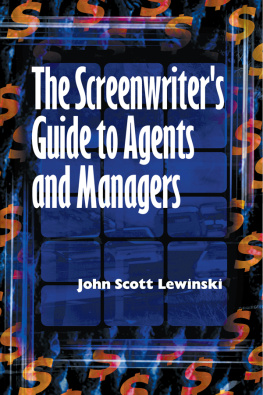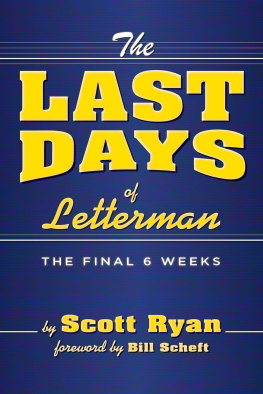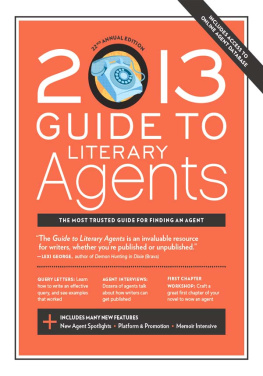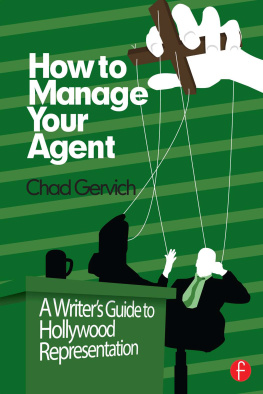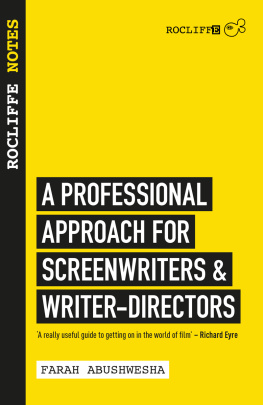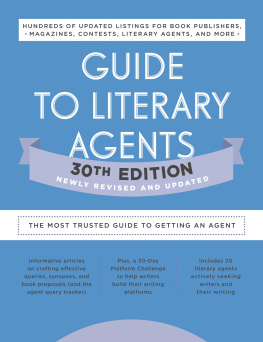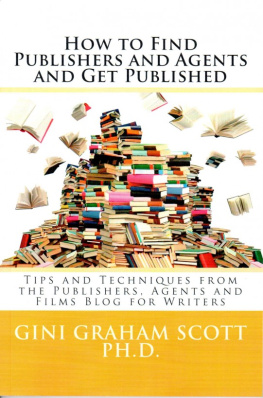
The
SCREENWRITERS GUIDE
to
AGENTS
and MANAGERS
JOHN SCOTT LEWINSKI

2001 John Scott Lewinski
All rights reserved. Copyright under Berne Copyright Convention, Universal Copyright Convention, and Pan-American Copyright Convention. No part of this book may be reproduced, stored in a retrieval system, or transmitted in any form, or by any means, electronic, mechanical, photocopying, recording, or otherwise, without prior permission of the publisher.
05 04 03 02 01 00 5 4 3 2 1
Published by Allworth Press
An imprint of Allworth Communications
10 East 23rd Street, New York, NY 10010
Cover design by Douglas Design Associates, New York, NY
Page composition/typography by SR Desktop Services, Ridge, NY
ISBN: 1-58115-079-2
Library of Congress Cataloging-in-Publication Data
Lewinski, John Scott.
The screenwriters guide to agents and managers / by John Scott Lewinski.
p. cm.
Includes bibliographical references and index.
ISBN 1-58115-079-2
1. Motion picture authorshipVocational guidance. 2. Television
authorshipVocational guidance. I. Title.
PN1996.L44 2001
808.2'3dc21 00-053124
Printed in Canada
DEDICATION
I dedicate this book to Sarah and Beth Lewinski, my sisters. They were my first, best friends and the only people on Earth who make it OK for me to act like a kid. That has nothing to do with agents, I know, but its my book. So there. Nyah!
Table of Contents
About THE AUTHOR
JOHN SCOTT LEWINSKI
J ohn Scott Lewinski writes sketch comedy, books, screenplays, interactive games, and magazine articles out of Los Angeles, CA.
Lewinski started out researching, writing, and producing public affairs programs for WMVS/WMVTPBS in Milwaukee, WI. After moving to Hollywood, he got his first job as a writers assistant for Steven E. de Souza (Die Hard, 48 Hours, Tomb Raider) and for the Black Entertainment Television comedy series, Comicview. He worked his way up to staff writer and wrote several sketches for the Comicview Players.
A one-time new media columnist for Earthweb, Writers Club, Cream Magazine On-Line, Inphobia Magazine, and Nautilus CD-ROM Magazine, his book, Developers Guide to Computer Game Design, is available from Wordware Publishing in Texas. His second book, Screenplaying, is now available at Amazon.com from Random House/Xlibris Publishing.
Lewinskis feature script, Darwins Game, won the 1996 Mel Brenner Award for Risk Taking in Screenwriting and entry into the 1997 First Annual Telluride Independent Film and Video Festival. His next script, Forced Perspective, won a 1999 Award from the Wisconsin State Film Commission and Screenwriters Forum for Best Screenplay Set in the State. That script also qualified as a quarterfinalist for the 1997 Nicholl Fellowship, the 1997 Austin Heart of Film Festival and the 1998 Empire High-Value Screenwriting Contest. Finally, he was a semifinalist for the Chesterfield Screenwriting Fellowship in 1998, 1995, and 1994. As a journalist, he covers the motion picture industry for Scr(i)pt Magazine, Creative Screenwriting Magazine, and Hollywood Scriptwriter.
A veteran Hollywood story editor, Lewinski served as Creative Executive Story Editor at Trimark Pictures and was closely involved in the development and production of the critically acclaimed Ernest Hemingways After the Storm for USA Networks and Summer of Miracles for CBS. He was also a story analyst for Fox Family Channel, Saban Entertainment, The Wallerstein Company, Evolve Entertainment, Val DOro Entertainment, and Scr(i)pt Magazine Screenplay Analysis Services. In 2000, he served as a judge for the $1 million Kingman Screenplay Contest.
Lewinskis interactive writing includes contributions to the multimillion selling CD-ROM games LucasArts Star Wars: Demolition, Broderbunds Riven, The Sequel to Myst, Command & Conquer II Tiberian Sun, Command & ConquerRed Alert, and The Journeyman Project 3, Legacy of Time. His feature articles on game writing and interactive industry trends currently appear in Amazing Stories Magazine and Game Developer Magazine. Lewinski also edits online forums covering interactive writing for Earthweb, (http://discussions.earthweb.com/).
Lewinski holds a Master of Fine Arts degree in screenwriting from Loyola Marymount University in Los Angeles and a Bachelor of Arts in journalism from Marquette University. He completed his study of English literature at Exeter College, Oxford University.
Born in Milwaukee, WI, Lewinski enjoys a good debate, movies, reading, music, college basketball, college football, boxing, fencing, horseback riding, photography, painting, computer art, cooking, and volunteer teaching.
Finally, he is no relation to Monica Lewinsky! Just look at the spelling! Its obviously different! He has nothing to do with her, whatsoever. Never did. Never will.
Unless such a connection might help his writing career...
ACKNOWLEDGEMENTS
I would like to give special thanks to the following outstanding individuals who made this book possible:
Tad Crawford at Allworth Press for the opportunity; Glenn Sobel for the patience; the Academy of Motion Picture Arts & Sciences Library; the Writers Guild of America; Daily Variety, Shelly Mellot at Scr(i)pt Magazine; and all the agents, managers, and assistants who graciously gave their time to share their experiences and passions.
INTRODUCTION
THE 10 PERCENT SOLUTION
As a writer, an agent hires you as a client so she can work for you.
T hey all asked me the same question. Writers, agents, publishers, journalists, friendseveryone! Why write a book about screenwriting agents? Arent they the forgotten part of the creative equation in Hollywood? The Oscars honor the best screenwriters alongside the producers and directors that brought their scripts to the screen. But theres no award for the agents who put all those people together and handle the deals.
There are plenty of screenwriting titles on the market. They handle everything from conceiving and writing a script to marketing and shooting it. Some might even briefly discuss agents and how to get one to market a given story. But I thought it was time we really examined the roles of agents and their professional relationships with their clients.
Other than perhaps a parent or a teacher, no single individual plays a more important role in a screenwriters development than his literary agent. However, there is no single entertainment industry professional less understood by writers than agents. Young writers want to impress them. Struggling writers berate them. Successful writers struggle with them. Retired writers often warn aspiring students away from them.
Writers too often treat agents and managers like possessions or objects. Just as writers know they need to buy a word processor and a three-hole punch, they believe they need to get an agent because every established professional has one. Nevertheless, few film and TV scribes truly know what agents and managers do every day, what they go through on behalf of their clients, or why the agents choose to tackle such a tough job. No wonder so many writers struggle to earn and keep an agents attention and support.
In my preliminary research for this book, I spoke to scores of aspiring and working screenwriters. I met them at screenwriting conferences from Chicago and Austin to Glendale and San Francisco. Some wanted to break into features or television writing. Others already had a credit under their belts and wanted an agent who could keep their career going or a manager capable of pushing them to the next creative or financial level.
Next page
